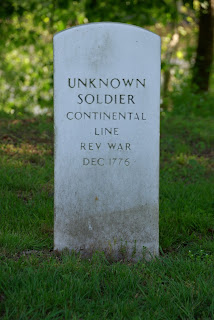In Princeton Cemetery, Aaron Burr is buried. More famous, or infamous, for his duel with Alexander Hamilton, in which Hamilton was killed on the cliffs of Weehawken in New Jersey, Burr also served as vice-president of the United States and was tried for, and acquitted of, treason. Born in 1756, he was 19 when war broke out at Lexington and Concord. He fought with Benedict Arnold at Quebec, with Washington in New York, and at Monmouth. He resigned from the army in 1779.
In an age when everything is available every minute to everyone, it is good to consider that some things really do remain unique. A person is buried only in one place, no matter how many memorials fill the globe. Burr's father was a president of Princeton University and is buried in the President's Plot in the cemetery. His son is also buried here. I am always struck by this particular grave--the physical connection to one of the most colorful and larger than life participants in a war that had its share of such people.

